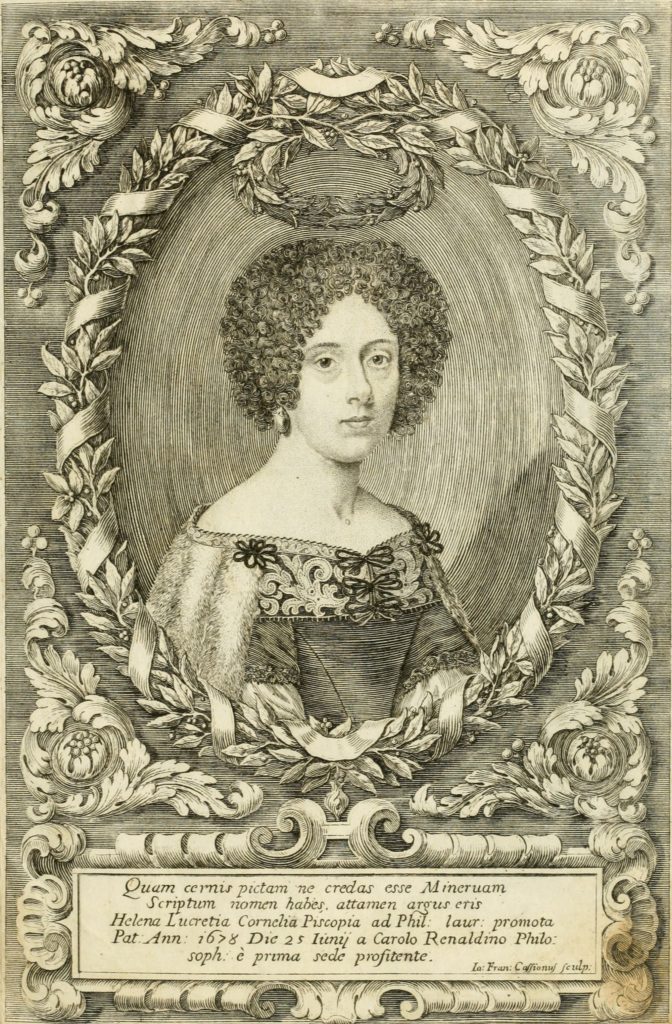On 25 June 1678, Elena Lucrezia Cornaro Piscopia is cross-examined in the Cathedral of the Blessed Virgin in Padua. Crowds of nobles, scholars and city officials are watching. Her answers on two Aristotelian theses impress her examiners and she is awarded the Doctorate of Philosophy degree. She is one of the first women to receive a doctorate in the world.
Over 440 years later, women with doctorates still encounter disbelief. The #ImmodestWomen hashtag on twitter occasionally fills with examples of people assuming ‘Dr’ is an exclusively male title. Most universities have only admitted women since the 1880s, and many did not award women degrees – let alone doctorates – until the 1920s.
Before Elena, there had been a handful of other women known as academics, primarily in Italy and Spain.
- Bettisia Gozzadini taught law at the University of Bologna in the thirteenth century.
- Bettina and Novella d’Andrea were fourteenth century sisters who taught law at the Universities of Padua and Bologna respectively.
- Dorotea Bucca held the chair of medicine and philosophy at Bologna for forty years from around 1390.
- Isabella Losa, a Spanish nun, received a doctor of divinity in the 1500s.
- Juliana Morell, another Spanish nun, is said to have sat an examination in France in 1608.
Why focus on Elena Piscopia?
Piscopia’s doctorate has the most surviving documentation, which is why it can be tied to an exact day. That is down to her position in Venetian society during the Renaissance.
She was born in Venice in 1646. Her father was a nobleman but, as her mother was not, Elena was barred from noble privileges. Even when her father married her mother, and recognised the children as his own, Venetian law forbade them receiving nobility. Her well-connected father – who was soon second only to the Doge in terms of power -employed tutors. They quickly recognised Elena’s intellect. Like many scholars of the time, she studied languages, mathematics, music, philosophy and astronomy.

By her early 20s, Piscopia was publishing translations of theological texts. In 1670 she became president of the Venetian society Accademia dei Pacifici. She enrolled at the University of Padua with the aim of studying for a degree in theology. The Bishop of Padua barred her from taking the theology exams, so she switched to philosophy. The university was due to hold her exam in their college. So much of society wanted to witness it that the exam had to be moved to the Cathedral. Her academic prowess was captured thanks to this, and to her father’s power.
She died, six years later, of tuberculosis.
Like what we do?
- You can find us on BlueSky and Mastodon, where we post daily about the women that have – and are – making history.
- You can buy us a ko-fi to support the running costs of the server, books and Mags’ caffeine habit.


Hello,
On July 13th I’m having an event called “Women: Subject or Object?”. The date changed & lost my key speakers. However, have asked one or two people if we can read out a page/account/chapter from their site/page – with due accreditation, of course. I was rather hoping we could introduce the ‘Education’ section with the above article? Am also handing out a bibliography of urls for the various sites I was permitted to plunder, so people can go and learn more about our fabulous foremothers.
Hi Cireena. Can you provide a link to the event? I did look on medium but nothing came up.